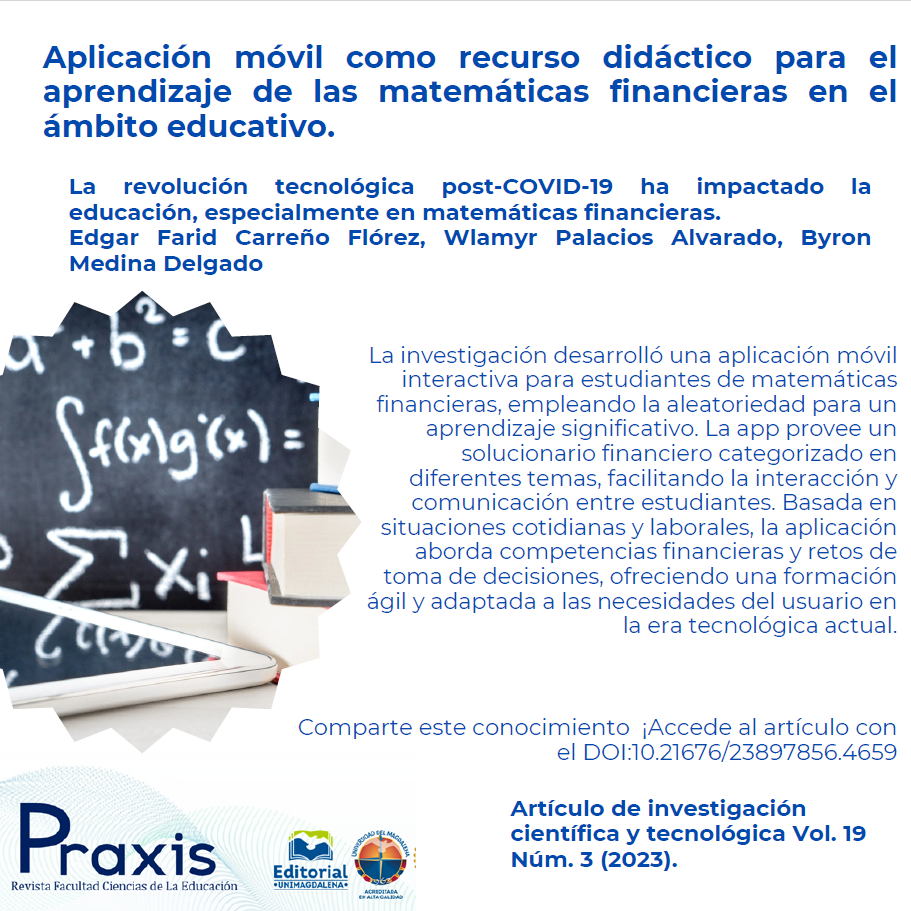Aplicación móvil como recurso didáctico para el aprendizaje de las matemáticas financieras en el ámbito educativo
Contenido principal del artículo
Resumen
El objetivo de la presente investigación fue desarrollar una aplicación móvil como un recurso interactivo y didáctico para los estudiantes del área de matemáticas financieras empleando como soporte la aleatoriedad del sistema con un enfoque de aprendizaje significativo. La investigación se efectuó mediante una óptica cualitativa-descriptiva en la que el diseño de la aplicación móvil provee un solucionario financiero previa selección del material de estudio y categorización en interés simple, compuesto, anualidades y gradientes. El aplicativo multimedia permite la clasificación y selección del material predispuesto en matemáticas financieras basado en la interacción por contenido y totalmente al azar a través del cual se asegura el trabajo equipo, la comunicación y el intercambio de saberes según el nivel resolutivo que pueda llegar alcanzar el estudiante. El modelo de estudio de las matemáticas financieras a partir del aplicativo móvil So.Mat.Fi está soportado en la captura de la atención del individuo en búsqueda de eludir la arbitrariedad y la ausencia de sustancialidad principales causas que influyen en la enseñanza significativa, lo que brinda la formación de modo ágil y sencillo de manera tal que los requerimientos del actual usuario de la cuarta revolución tecnológica puedan ser satisfechos.
Descargas
Detalles del artículo

Esta obra está bajo una licencia internacional Creative Commons Atribución-NoComercial-CompartirIgual 4.0.
Citas
Aznar, I., Hinojo, F. J., Cáceres, M. P., y Romero, J. M. (2020). Analysis of the determining factors of good teaching practices of mobile learning at the Spanish University. An explanatory model. Computers & Education, 159(2020), 1-12. https://doi.org/10.1016/j.compedu.2020.104007
Bernacki, M. L., Greene, J. A., y Crompton, H. (2019). Mobile Technology, Learning, and Achievement: Advances in Understanding and Measuring the Role of Mobile Technology in Education. Contemporary Educational Psychology, 60, 1-34. https://doi.org/10.1016/j.cedpsych.2019.101827
Backfisch, I., Scherer, R., Siddiq, F., Lachner, A., & Scheiter, K. (2021). Teachers’ technology use for teaching: Comparing two explanatory mechanisms. Teaching and Teacher Education, 104, 1-16. https://doi.org/10.1016/j.tate.2021.103390
Badillo, V. T. e Iguarán, A. M. (2020). Uso de las TIC en la enseñanza-aprendizaje de la comprensión lectora en niños autistas. Praxis, 16(1), 55-63. https://doi.org/10.21676/23897856.3406
Baloco, C. y López, O. (2022). Ambientes virtuales con metodología de aprendizaje basado en problemas (ABP): Una estrategia didáctica para el fortalecimiento de competencias matemáticas de las herramientas multimedia interactivas para la enseñanza en educación preescolar. Praxis, 18(2), 1-22. https://doi.org/10.21676/23897856.3919
Brito Amaya, M. J. (2019). Estrategias pedagógicas como herramienta para transformar la praxis financiera. Praxis, 15(2), 177-192. https://doi.org/10.21676/23897856.2987
Castro Campos, P. A. (2022). Reflexiones sobre la educación STEAM, alternativa para el siglo XXI. Praxis, 18(1), 158-175. https://doi.org/10.21676/23897856.3762
Contreras, F. A. (2016). El aprendizaje significativo y su relación con otras estrategias. Horizonte de la Ciencia, 6(10), 130-140. https://doi.org/10.26490/uncp.horizonteciencia.2016.10.210
Courage, M. L. (2019). Interactive Technologies: Tablets, Smartphones, and Learning. En J. B. Benson. (Eds.), Encyclopedia of Infant and Early Childhood Development (Second Edition) (pp. 194-201). https://doi.org/10.1016/B978-0-12-809324-5.23561-X
Chen, Y. L., & Hsu, C. C. (2020). Self-regulated mobile game-based English learning in a virtual reality environment. Computers & Education, 154, 1-15. https://doi.org/10.1016/j.compedu.2020.103910
De la Riva, G. A., Espinosa, C. C, & Juárez, M. (2015). Sustainability in engineering education: an approach to reach significant learning and character skills. En J. P. Davim. (Eds.), Sustainability in Higher Education (pp. 97-125). Chandos Publishing. https://doi.org/10.1016/B978-0-08-100367-1.00005-6
Garcés, L. F., Montaluisa, A., y Salas, E. (2018). El aprendizaje significativo y su relación con los estilos de aprendizaje. Anales de la Universidad Central del Ecuador, 1(376), 231-248. https://doi.org/10.29166/anales.v1i376.1871
Gómez, L. E., Muriel, L. E., y Londoño, D. A. (2019). El papel del docente para el logro de un aprendizaje significativo apoyado en las TIC. Encuentros, 17(02), 118-131. https://www.redalyc.org/articulo.oa?id=476661510011.
Hernández, R., Fernández, C., y Baptista, P. (Ed.). (2014). Metodología de la Investigación. Editorial Mc Graw Hill Education.
Kompen, R., Edirisingha, P., Canaleta, X., Alsina, M., y Monguet, J. M. Personal learning Environments based on Web 2.0 services in higher education. Telematics and Informatics, 38, 194-206. https://doi.org/10.1016/j.tele.2018.10.003
Osorio, E. D., Malpartida, J. N., Ávila, H., y Valenzuela, A. (2021). Aplicaciones móviles: incorporación en procesos de enseñanza en tiempos de covid-19. Revista Venezolana de Gerencia, 26(93), 64-74. https://doi.org/10.52080/rvg93.06
Parra, M. E., Parejo, N., Conde, A, y Olmedo, E. M. (2021). Relationship between the personal learning environment and the educational level of unaccompanied foreign minors. International Journal of Intercultural Relations, 80, 17-26. https://doi.org/10.1016/j.ijintrel.2020.10.009
Pimmer, C., Mateescu, M., y Gröhbiel, U. (2016). Mobile and ubiquitous learning in higher education settings. A systematic review of empirical studies. Computers in Human Behavior, 63, 490-501. https://doi.org/10.1016/j.chb.2016.05.057
Sophonhiranrak, S. (2021). Features, barriers, and influencing factors of mobile learning in higher education: A systematic review. Heliyon, 7, 1-10. https://doi.org/10.1016/j.heliyon.2021.e06696
Shamsujjoha, Md., Grundy, J., Li, L., Khalajzadeh, H., & Lu, Q. (2021). Developing Mobile Applications Via Model Driven Development: A Systematic Literature Review. Information and Software Technology, 140, 1-24. https://doi.org/10.1016/j.infsof.2021.106693
Szymkowiak, A., Melović, B., Dabić, M., Jeganathan, K., & Kundi, G. (2021). Information technology and Gen Z: The role of teachers, the internet, and technology in the education of young people. Technology in Society, 65, 1-10. https://doi.org/10.1016/j.techsoc.2021.101565
Trujillo, Y., Trejo, M., & Campos S. (2021). Telementoring of in-home real-time laparoscopy using whatsapp messenger: An innovative teaching tool during the COVID-19 pandemic. A cohort study. Annals of Medicine and Surgery, 62, 481-484. https://doi.org/10.1016/j.amsu.2021.01.085
Vega, M., y Appelgren, D. (2019). E-portafolio: una herramienta para el desarrollo de la práctica reflexiva de profesores en formación. Praxis, 15(1), 57-68. https://doi.org/10.21676/23897856.2983
Wei, W., Mejía, C., & Qi, R. (2021). A personal learning environment (PLE) approach to mobile teaching and learning on a short-term study abroad. Journal of Hospitality, Leisure, Sport & Tourism Education, 29, 1-12. https://doi.org/10.1016/j.jhlste.2020.100296

